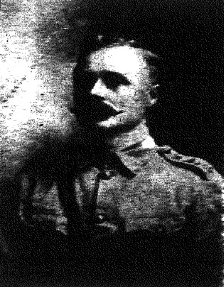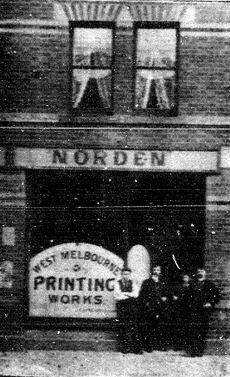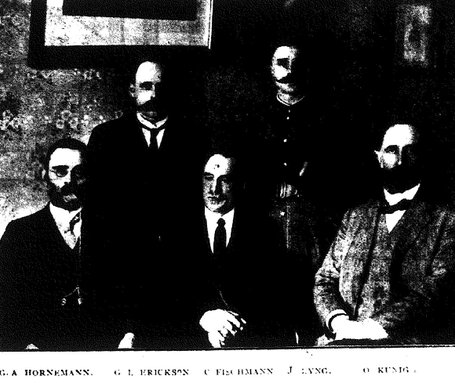Jens lyng (1868-1943) - editor and army captain

Jens Lyng was an author, editor, Australian army captain and public servant who was deeply involved in researching and writing about Scandinavians in Australia.
He played an important role as an interpreter, censor and editor for the Australian Military Forces during the First World War and contributed greatly to the Scandinvian society in Melbourne.
He played an important role as an interpreter, censor and editor for the Australian Military Forces during the First World War and contributed greatly to the Scandinvian society in Melbourne.
from denmark to australia
Jens Sørensen Lyng was born on 16 April 1868 in Hasle, near Aarhus in Denmark. After finishing school he joined the Danish army where he rose to the rank of lieutenant.
In 1891, aged 23, Jens emigrated to Melbourne where he initially worked in farming and as a labourer until he found employment as Baron von Mueller’s private secretary. He also became heavily involved in the Scandinavian communities in Melbourne and was appointed secretary of the Danish society in 1896. Jens became naturalised as a British subject in 1900.
In 1891, aged 23, Jens emigrated to Melbourne where he initially worked in farming and as a labourer until he found employment as Baron von Mueller’s private secretary. He also became heavily involved in the Scandinavian communities in Melbourne and was appointed secretary of the Danish society in 1896. Jens became naturalised as a British subject in 1900.
'Norden'
 Norden's printing shop in West Melbourne
Norden's printing shop in West Melbourne
In 1896, Jens founded a monthly Scandinavian newspaper, Norden, producing it single-handedly. By 1900 he was editor, typesetter as well as publisher. He eventually resigned as editor in 1906.
Jens married Mary Eleanor Gertrude Burrowew in 1897 and they had four children. In 1906, they moved to Kinglake, north of Melbourne, together with a few other Danish families where Jens bought a farm.
However, they later returned to Melbourne and Jens started working as a public servant in different government departments. Initially he was employed in the Commonwealth Bureau of Statistics (where he was involved in the 1911 census) and later as a cartographer to the Ministry of Fisheries.
He was also involved with the army, commissioned as a lieutenant in the Senior Cadets in 1912.
Jens married Mary Eleanor Gertrude Burrowew in 1897 and they had four children. In 1906, they moved to Kinglake, north of Melbourne, together with a few other Danish families where Jens bought a farm.
However, they later returned to Melbourne and Jens started working as a public servant in different government departments. Initially he was employed in the Commonwealth Bureau of Statistics (where he was involved in the 1911 census) and later as a cartographer to the Ministry of Fisheries.
He was also involved with the army, commissioned as a lieutenant in the Senior Cadets in 1912.
first world war
 Norden sub-committee (Jens Lyng, back row from the right)
Norden sub-committee (Jens Lyng, back row from the right)
In 1914, at the outbreak of WWI, Jens joined the Australian Navy and Military Expeditionary Force and went with the commander of the force, Colonel William Holmes, for the first phase of the occupation of German New Guinea. Given his fluency in German and his past editorial experience, Jens had responsibility not just as an interpreter but also for the Government Printing Office in Rabaul. Here he was the printer, publisher and editor of the official Government Gazette and the Rabaul Record. He also censored letters, which were sent to German planters. In 1916, Jens was promoted to captain and in 1918 he was made district officer at Madang in Kaiser Wilhelmsland.
After the war, Jens returned to the Commonwealth Bureau of Statistics as chief draughtsman. He continued his deep involvement in the Scandinavian communities in Melbourne acting as a secretary for the company behind Norden. In 1922, he was equally instrumental in forming the Scandinavian Progress Association, which later became a branch of the New Settlers’ League of Australia, the only non-British body admitted to the league.
After the war, Jens returned to the Commonwealth Bureau of Statistics as chief draughtsman. He continued his deep involvement in the Scandinavian communities in Melbourne acting as a secretary for the company behind Norden. In 1922, he was equally instrumental in forming the Scandinavian Progress Association, which later became a branch of the New Settlers’ League of Australia, the only non-British body admitted to the league.
strong danish roots
Jens wrote several books both on his time in New Guinea as well as on his research into Scandinavians in Australia. In 1927, the University of Melbourne granted him the Harbison-Higinbotham scholarship to study non-British settlers. The grant enabled him to write the book Non-Britishers in Australia.
In 1923, Jens approached the Victorian government to ask for grants for land covering about 40 farms to entice Danish emigrants to come to Victoria. As a result, the government offered not only land but also made assurances regarding the supply of homes and roads. Settlers were required to have £400 on arrival. However, when Jens travelled to Denmark to promote the scheme, he found that Danish agriculture was booming and there was little incentive for people to move across to the other side of the world. As a result, the scheme never materialised.
Jens was President of the Danish Club in Melbourne in 1928, but when the Bureau of Statistics moved their operation to Canberra, Jens went with them. The Danish Club set up a ‘Jens Lyng Research Fund’ to assist him in furthering his research into Scandinavians and their settlement in Australia and New Zealand. Jens retired from his public service work in 1932 but continued as a secretary for the Canberra Returned Soldiers’ Club until 1937. He was also one of the founding fathers of the Australian National Review, also in 1937.
The family returned to Melbourne and Jens published his major work Scandinavians in Australia, New Zealand and the Western Pacific based on 44 years of research.
In 1943, Jens died in Birchip, Victoria at the age of 73, survived by a daughter and two sons.
In 1923, Jens approached the Victorian government to ask for grants for land covering about 40 farms to entice Danish emigrants to come to Victoria. As a result, the government offered not only land but also made assurances regarding the supply of homes and roads. Settlers were required to have £400 on arrival. However, when Jens travelled to Denmark to promote the scheme, he found that Danish agriculture was booming and there was little incentive for people to move across to the other side of the world. As a result, the scheme never materialised.
Jens was President of the Danish Club in Melbourne in 1928, but when the Bureau of Statistics moved their operation to Canberra, Jens went with them. The Danish Club set up a ‘Jens Lyng Research Fund’ to assist him in furthering his research into Scandinavians and their settlement in Australia and New Zealand. Jens retired from his public service work in 1932 but continued as a secretary for the Canberra Returned Soldiers’ Club until 1937. He was also one of the founding fathers of the Australian National Review, also in 1937.
The family returned to Melbourne and Jens published his major work Scandinavians in Australia, New Zealand and the Western Pacific based on 44 years of research.
In 1943, Jens died in Birchip, Victoria at the age of 73, survived by a daughter and two sons.